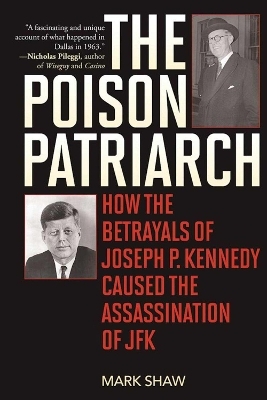
The Poison Patriarch
How the Betrayals of Joseph P. Kennedy Caused the Assassination of JFK
Seiten
2016
Sky Pony Press (Verlag)
978-1-5107-0419-0 (ISBN)
Sky Pony Press (Verlag)
978-1-5107-0419-0 (ISBN)
- Keine Verlagsinformationen verfügbar
- Artikel merken
"An unusual route into the thicket of JFK conspiracy literature." - Kirkus Reviews For fifty years, Shaw maintains, researchers investigating the president's murder in Dallas have been looking at the wrong motives and actors. The Poison Patriarch offers a shocking reassessment-one that is sure to alter the course of future assassination debates.
Focusing for the first time on why attorney general Robert F. Kennedy wasn’t killed in 1963 instead of on why President John F. Kennedy was, Mark Shaw offers a stunning and provocative assassination theory that leads directly to the family patriarch, Joseph P. Kennedy.
Mining fresh information and more than forty new interviews, Shaw weaves a spellbinding narrative involving Mafia don Carlos Marcello; Jack Ruby (Lee Harvey Oswald’s killer); Ruby’s attorney, Melvin Belli; and, ultimately, the Kennedy brothers and their father.
Shaw addresses these tantalizing questions:
Why, shortly after his brother’s death, did a grief-stricken RFK tell a colleague, “I thought they would get one of us . . . I thought it would be me”?
Why was Belli, an attorney with almost no defense experience (but proven ties to the Mafia), chosen as Jack Ruby’s attorney?
How does Belli’s Mafia connection call into question his legal strategy, which ultimately led to the Ruby’s first-degree murder conviction and death sentence?
What was Joseph Kennedy’s relationship to organized crime? And how was his insistence that JFK appoint RFK as attorney general tantamount to signing the president’s death warrant?
For fifty years, Shaw maintains, researchers investigating the president’s murder in Dallas have been looking at the wrong motives and actors. The Poison Patriarch offers a shocking reassessment—one that is sure to alter the course of future assassination debates.
Focusing for the first time on why attorney general Robert F. Kennedy wasn’t killed in 1963 instead of on why President John F. Kennedy was, Mark Shaw offers a stunning and provocative assassination theory that leads directly to the family patriarch, Joseph P. Kennedy.
Mining fresh information and more than forty new interviews, Shaw weaves a spellbinding narrative involving Mafia don Carlos Marcello; Jack Ruby (Lee Harvey Oswald’s killer); Ruby’s attorney, Melvin Belli; and, ultimately, the Kennedy brothers and their father.
Shaw addresses these tantalizing questions:
Why, shortly after his brother’s death, did a grief-stricken RFK tell a colleague, “I thought they would get one of us . . . I thought it would be me”?
Why was Belli, an attorney with almost no defense experience (but proven ties to the Mafia), chosen as Jack Ruby’s attorney?
How does Belli’s Mafia connection call into question his legal strategy, which ultimately led to the Ruby’s first-degree murder conviction and death sentence?
What was Joseph Kennedy’s relationship to organized crime? And how was his insistence that JFK appoint RFK as attorney general tantamount to signing the president’s death warrant?
For fifty years, Shaw maintains, researchers investigating the president’s murder in Dallas have been looking at the wrong motives and actors. The Poison Patriarch offers a shocking reassessment—one that is sure to alter the course of future assassination debates.
Mark Shaw, the author of more than twenty books, was a criminal defense attorney before becoming a television legal analyst for Good Morning America. He went on to correctly predict the outcomes of both the Mike Tyson and O. J. Simpson trials for, among others, CNN, ABC, and ESPN. He wrote several columns analyzing the Tyson case for USA Today. In 2004, he analyzed the Kobe Bryant case for ESPN and USAToday.com. He lives in Superior, Colorado.
| Erscheint lt. Verlag | 25.8.2016 |
|---|---|
| Zusatzinfo | B&W photos |
| Verlagsort | New York |
| Sprache | englisch |
| Maße | 152 x 229 mm |
| Gewicht | 526 g |
| Themenwelt | Geschichte ► Allgemeine Geschichte ► Zeitgeschichte |
| Geisteswissenschaften ► Geschichte ► Regional- / Ländergeschichte | |
| Sozialwissenschaften ► Politik / Verwaltung | |
| Sozialwissenschaften ► Soziologie | |
| ISBN-10 | 1-5107-0419-1 / 1510704191 |
| ISBN-13 | 978-1-5107-0419-0 / 9781510704190 |
| Zustand | Neuware |
| Haben Sie eine Frage zum Produkt? |
Mehr entdecken
aus dem Bereich
aus dem Bereich
Gewalt, Umwelt, Identität, Methode
Buch | Softcover (2024)
Spector Books OHG (Verlag)
36,00 €
wie Freud im Kollektiv verschwand
Buch | Hardcover (2024)
Klett-Cotta (Verlag)
25,00 €


